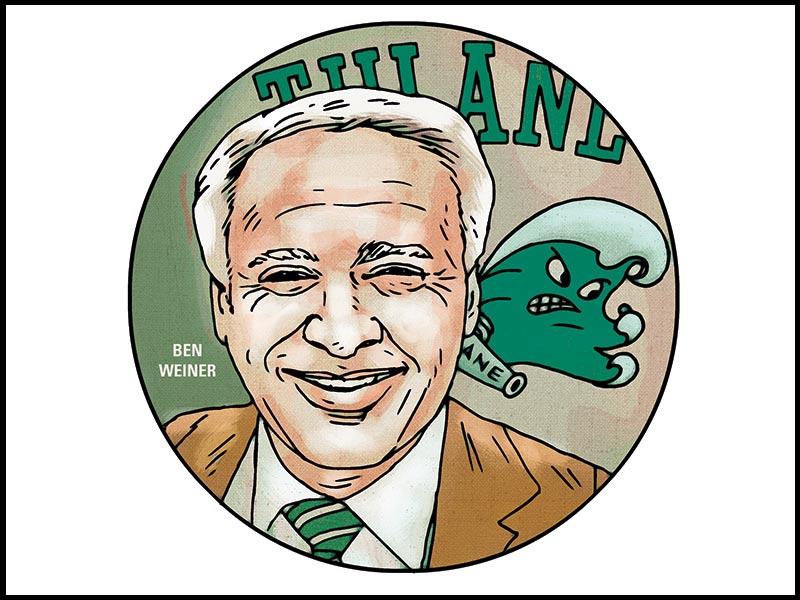War stories
It snakes some four-tenths of a mile from the large avenue named for the first elected governor after Louisiana gained statehood in 1812, William Charles Cole Claiborne, to Willow Street, so named—hard to believe—for what was once a remote swampy area surrounded by weeping willows.
Like other roadways and edifices on campus, Ben Weiner Drive is named for one of Tulane’s great benefactors. Weiner is a name well known by the older Green Wave community for his generous support and love for the athletic department and his alma mater. So it’s the perfect designation for a street where Greer Field at Turchin Stadium (baseball), Wilson Athletic Center (athletic offices), Yulman Stadium (football) and Hertz Center (basketball and volleyball practice facility) are located.
Mr. Ben, or Ben, or Benny, as he was referred to, made his fortune in the furniture rental business, served as president of the Green Wave Club from 1974 to 1988, established the Ben Weiner Foundation and never missed a single Tulane home football game from 1924 through 1995, except for his years of military service. There’s no reason younger Tulanians, such as this year’s freshman class, could or should know all this, as they weren’t born when Weiner died in 1997.
But his military service is where they might be able to relate to this fine gentleman, sportsman and raconteur. Like many people of his era, Weiner served two years in the Army Air Corps during World War II. He was part of the 466th Bomber Group. Stationed in Norwich, England, the group flew 232 missions and was involved with the first raid on Berlin.
I met Ben Weiner in the 1960s, not surprisingly for those who know me, at the Fair Grounds Race Course. Weiner owned and raced thoroughbreds, some of them champions, such as stakes winners Bull Story and Orleans Doge. Our paths crossed through the years—again, no upset—and much, much later he invited me up to his suite at the Roosevelt/then Fairmont/then Roosevelt again hotel, where he lived for more than half a century. We talked Tulane football, thoroughbred bloodlines and gambling.
The outgoing Weiner had become the hotel’s glad-hand man and greeter because hotel owner Seymour Weiss was not fond of nightlife. Weiner reveled in it, claiming he went to the Blue Room “every night for 35 or 40 years.” Stars who performed there such as Jimmy Durante and bandleader Xavier Cugat were pals and regulars at Weiner’s gin rummy games in his room.
Tulane’s younger students may have seen reruns or heard about the award-winning TV series “M*A*S*H” from their parents. Well, one of the stars was the scrounger Cpl. “Radar” O’Reilly, as played by Gary Burghoff. And that’s what Weiner was. He ran the officers’ club, and his chief duty was to scrounge booze, no easy task.
The bombing strikes were traumatic, planes sometimes shot down, so the commanding officer had instructed Sgt. Weiner to have all the liquor the troops wanted to drink when they returned from a raid. Weiner, calling this his favorite war story, said that one day he got a call from President Franklin Delano Roosevelt’s son, Elliott Roosevelt, who was the commanding officer of a unit stationed about 40 miles away from Weiner’s.
"I understand you got some Irish whiskey,” Weiner recalled the commander saying. “I got some brandy and I know you don’t have any. So I’ll swap you as many cases as you can stuff in your car.”
Weiner called that normal wartime horse-trading, even if it was the president’s son. Sgt. Weiner made the trip late in the day, so Roosevelt invited him in to have dinner. For dessert, bananas were served. This may sound dull, but Weiner explained that bananas were unheard of in wartime England. They couldn’t use the shipping space to get them in because of the war. Roosevelt wouldn’t divulge how he came by the bananas, but he offered Weiner as many as he could stuff into his trench coat, which is what Weiner did.
When he got back to the officers’ club, he threw the bananas on the bar, where they were sliced up, fought over and devoured. A major asked for a whole one because he said he “missed bananas more than his wife.” Weiner recognized a great line and gave him one.
A day later, the major asked for more because there was an appeal for bananas to fulfill a dying wish from a young British girl. The major still had his but was embarrassed to go with only one. Weiner went to the kitchen, made a fruit basket and crowned it with the lone banana.
When the major pulled up to the girl’s house, there were a lot of high-ranking brass who had brought imitation bananas. When the major presented his basket to the girl, a picture was taken. That picture was eventually reproduced and used to symbolize the friendship between the U.S. and British forces.
Weiner found the whole episode ironic. Why? It all happened because of him swapping whiskey, proving once again that life has more strange stories than you could ever make up.
This column originally appeared in the December 2016 issue of Tulane magazine.

